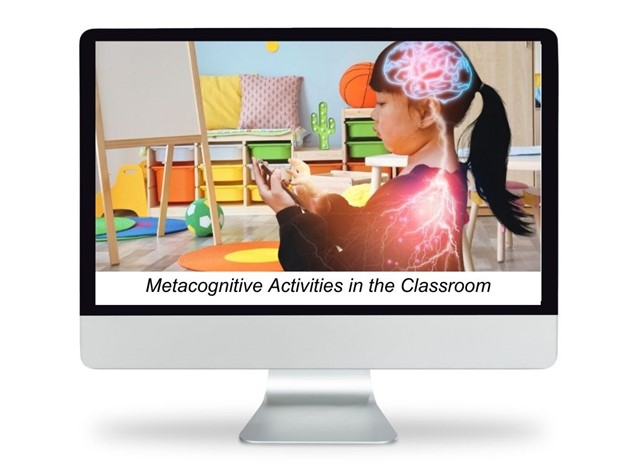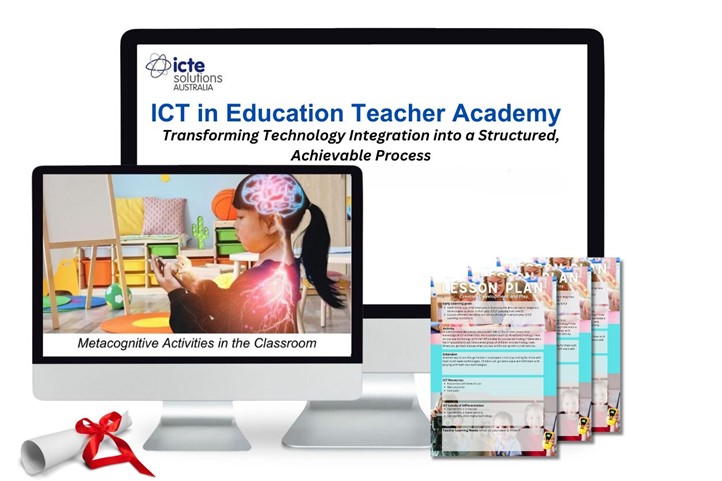Unlocking Young Minds:
How Our Membership Helps ECE Teachers Develop Metacognition Through Done-for-You Strategies and Activities
When Mia first subscribed to the "Technology in ECE" blog, she was simply looking for practical insights into metacognition in early childhood education. She had heard about how important it was to help children "think about their thinking," but practical resources felt scarce. One afternoon, after searching for guidance on metacognitive teaching strategies, Mia found herself engrossed in an article much like this one.
Like many early childhood educators, Mia’s journey began by looking for something simple — a practical, ready-to-use strategy she could apply immediately. What she found was the first step in a much larger professional transformation.
Little did she know that landing on this blog post would be the turning point that led her to join the ICT in Education Teacher Academy membership—a community where she found not just information, but an actionable, transformational pathway.
Understanding Metacognition in Early Childhood and How to Apply It
Metacognition in education refers to a learner’s ability to understand and control their own learning processes. In early childhood, fostering metacognition means helping children become aware of their thinking, plan their actions, monitor their strategies, and reflect on their outcomes (metacognition in early childhood).
When considering how to apply metacognition in the classroom, early childhood educators can embed strategies that encourage children to plan, question, evaluate, and reflect.
To truly develop metacognition in students, educators must nurture children's capacity to:
-
Set their own learning goals.
-
Choose appropriate strategies.
-
Monitor their progress.
-
Reflect and adjust their thinking (metacognitive strategies in the classroom).
Simple yet powerful approaches to improve metacognition in the early years include using open-ended questioning, modeling "thinking aloud," encouraging peer discussions, and promoting self-assessment (how to improve metacognition in the classroom).
Teaching young children how to use metacognition in the classroom strengthens problem-solving, critical thinking, and resilience. Importantly, metacognitive activities in the classroom must be developmentally appropriate: prompting reflection during play, asking children why they made choices, or encouraging alternative solutions.
As Mia learned through her journey, understanding what is metacognition in child development opens the door to broader learning strategies that help children move from passive to active learners — learners who are aware of their thinking.
When children use metacognitive learning strategies, they become capable of managing challenges, adapting strategies, and explaining their learning processes — key components of future academic success.
This is why developing metacognitive skills in the classroom is crucial: it builds autonomy, confidence, and lifelong learning habits.
Inside the membership, Mia found exactly what she needed: done-for-you metacognition activities for kindergarten and metacognitive teaching strategies woven into rich digital activities. These experiences allowed her to practice teaching strategies to develop metacognition in everyday classroom moments.
After applying some of the done-for-you metacognitive activities, Mia naturally began to adapt these lessons to better suit her children's learning needs. She noticed how different strategies worked for different learners — and reflection became an essential part of her teaching.

Teaching Strategies That Foster Metacognition in Early Childhood
When Mia explored the ICT in Education Teacher Academy membership further, she discovered a treasure trove of teaching strategies in early childhood education that naturally promoted metacognition.
Here’s what she found:
-
Teaching strategies for early childhood teachers must combine intentional teaching with scaffolding.
-
Early childhood teaching strategies should promote independence, reflection, and choice.
-
If you ask, what are teaching strategies in early childhood?, the answer includes modeling, questioning, encouraging prediction, and offering structured reflection opportunities.
Mia started applying these teaching strategies for preschool learners, and immediately noticed the shift—her students became more thoughtful, made better choices, and explained their reasoning with growing confidence.
The key teaching strategies Mia used to develop metacognition in students included:
-
Modeling thinking aloud.
-
Asking open-ended, reflective questions.
-
Encouraging students to plan before acting.
-
Promoting evaluation and modification of ideas.
-
Giving choices and asking children to explain their selections.
She learned that teaching strategies that develop metacognition in students need to be consistent, embedded into daily routines, and supported through well-designed activities — exactly what the membership provides.

Top 10 Done-for-You Activities Where ECE Teachers Can Apply Metacognitive Strategies
Each of the following activities is available inside the ICT in Education Teacher Academy and designed to apply metacognitive strategies in teaching:
-
Drawing with Programmable Toys
Children plan and program Bee Bots to create patterns on cardboard. Strategy: Encourage children to predict what their path will look like, evaluate outcomes, and adjust their programming. -
Outdoor Digital Storytelling
Children record nature sounds and create a digital story. Strategy: Prompt reflection on why certain sounds were chosen to match parts of their stories. -
QR Code Nature Hunt
Children scan QR codes to discover facts about nature. Strategy: After scanning, ask children to explain their predictions versus the actual findings. -
Sorting Animals with Technology
Children sort pet photos into categories. Strategy: Ask children to justify their sorting choices and reconsider after peer discussion. -
Taking Apart a Computer
Children explore and dismantle old ICT equipment. Strategy: Invite them to predict functions before taking parts apart and reflect on new understandings. -
Augmented Reality Exploration
Children use AR to identify plants and animals. Strategy: Encourage children to explain how they identified the organism and what evidence supports their thinking. -
Bee Bot School Bus Game
Children plan routes for a Bee Bot ‘bus’. Strategy: Children predict the best routes, test them, and refine based on outcome. -
Digital Nature Photography
Children photograph patterns in nature. Strategy: Ask them to describe why they chose certain patterns and what it reveals about nature. -
Coding with Nature
Children code toys through outdoor obstacle courses. Strategy: After completing a course, children explain how they adjusted their code. -
Creating Abstract Art with Bee Bot
Children create digital artwork through programmed movement. Strategy: Prompt children to reflect on how different commands created different art outcomes.
With growing confidence, Mia began designing her own activities, blending her new knowledge of metacognitive strategies with digital tools creatively. Sharing her ideas and reflections in the member community, Mia not only deepened her own practice but inspired others to explore new ways of integrating metacognition into early learning.

How the Membership Helps Educators Like Mia Foster Metacognition
When Mia became a member, she immediately gained access to:
-
Done-for-you lesson plans embedded with metacognitive strategies in the classroom.
-
Step-by-step guidance on teaching metacognition strategies using technology.
-
Access to the exclusive Membership Workbook, which helped Mia plan, observe, and reflect on applying metacognitive strategies.
-
Community forums where members share adaptations, successes, and new ideas for using metacognition in the classroom.
The "Technology Integrator's Learning Journey to Transformation" pathway inside the membership made Mia’s professional growth feel structured, achievable, and exciting.
She didn’t just use activities—she became intentional, strategic, and reflective, embodying exactly what she wanted her students to develop.

Metacognitive Strategies in Early Childhood Learning
To be able to develop ICT capability in children, they need to know more than just the knowledge of techniques and processes.
Teaching simply this is not sufficient anymore for the successful application of ICT to problem situations. They need to choose to use that knowledge, monitor the progress being made and evaluate the solutions gained.
Metacognition – knowing what you know – is significant for young children and it empowers them as they are given independent choice.
Children need to do more than just give an answer to a problem - they have to explain how they came that answer.
As a early childhood teachers which include that of a preschool teacher and a kindergarten teacher, you need to engage in conversation around what children are doing and how they are problem-solving with the technology.
Skilful teaching of skills and techniques ensures that children are well supported so that they are able to choose successfully.
In early childhood, higher order skills are demonstrated when young children:
- Decide when it is appropriate to use ICT as a tool for a specific purpose.
- Plan what routines, techniques and process need to be used.
- Work independently to solve problems.
- Evaluate their use of ICT and the outcome it presents.
- Explain and justify their choices to approaches.
- Reflect on their learning with ICT and question how things might be changed for the better outcome next time around.
The issue which you need to be aware of is not whether a child knows a technique or process, it is whether they know that they know and thus able to decide whether it is appropriate to use.
You could ask them how they feel about using the technique as this is a further aspect of metacognitive knowledge.
What you might find is that if they are positive or confident about it, they will use it again.
What else can you do as a teacher or parent?
- Tune in – listen carefully to what is being said and observe their body language and what they are doing.
- Be genuinely interested in what they are doing – maintain eye contact, smile and nod.
- Respect their decisions and choices – ask them to elaborate.
- Re-cap the experience.
- Offer your own experience.
- Clarify ideas.
- Make suggestions.
- Remind them of things to do.
- Encourage further thinking.
- Offer an alternative viewpoint.
- Speculate and reciprocate.
- Use positive questioning.
- Ask open-ended questions.
- And model your thinking out aloud in front of them.
From foundation to Year 6, children can attain a level of independent choice in relation to their use of ICT by employing these metacognitive teaching strategies. The goal of any early childhood teacher, albeit preschool or kindergarten, should be to encourage young children to communicate their thinking process. That's metacognition.
Metacognition and Children - Further Strategies
There are many other ways that you can help develop metacognition in children. Helping children ‘think about thinking’ will enable them to change their behaviour. According to Child Mind Institute “more and more studies are suggesting that kids who are taught to use metacognitive strategies early on are more resilient and more successful, both in and out of school.”
Here are some metacognitive teaching strategies that you can use today.
- Use open-ended questions – allow them time to reflect on their thinking.
- Non-blaming – ask them to think about their behaviour so that you can help them to manage and learn how to deal with difficult situations.
- Solution-focused – you can encourage them to think about how they can use their understanding to change things in the future.
- Process-orientated – you can ask questions to help the child get a better idea of how their thought process works.
Metacognition in early childhood is about making sense of life experiences especially when it comes to using technology in learning environments.
Other metacognitive teaching strategies that Edutopia suggests include:
- Teach students how their brains are wired for growth;
- Give students practice recognising what they don’t understand;
- Provide opportunities to reflect on work (very important for ICT learning);
- Have students keep learning journals.
Learning how to learn is important and using metacognitive teaching strategies you will enable students to develop an awareness of their own knowledge of ICT techniques and processes, the opportunities and limitations offered by the possible use of ICT techniques and processes, and their ability to regulate their own actions in the application of knowledge.


Reflecting on the Journey: Why Metacognition and Teaching Strategies Matter
Mia's story shows the real impact of applying metacognition teaching strategies and strong teaching strategies for early childhood education. Developing metacognition in early childhood empowers young learners to take control of their learning, make thoughtful choices, and reflect on their growth.
By using the carefully designed lesson plans and strategies from the ICT in Education Teacher Academy, Mia could weave metacognitive strategies into her daily teaching—without overwhelm.
This is the power of being part of a community that doesn’t just offer resources but guides educators through their professional learning journey with targeted teaching strategies for early childhood teachers that foster real growth and transformation.
Your journey doesn’t require perfection or complete mastery — it simply starts with one step: downloading your first lesson plan, applying it with intention, and letting the transformation unfold.
Are you ready to foster metacognitive thinkers in your classroom and elevate your teaching strategies?
Join the ICT in Education Teacher Academy today and start your own transformation!
Pay just $5 for the first month ($20 per month afterwards) or $$$AVE and pay annually for just $200 per Year (2 months FREE)
